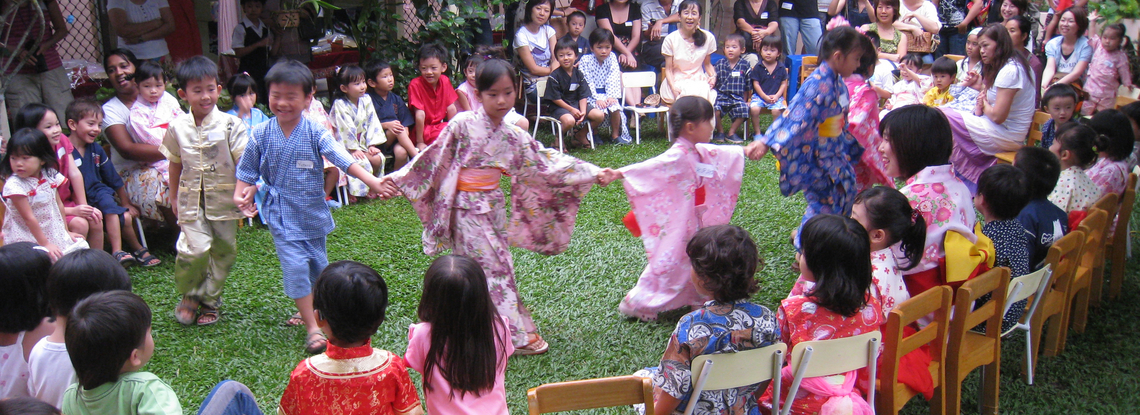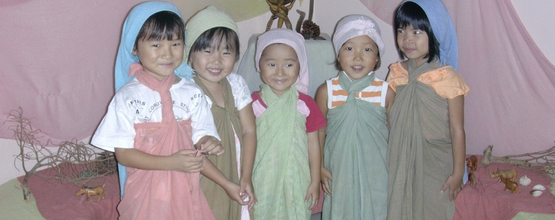Experiences that prepare for the journey of life
Malaysia is a country with diverse cultural traditions. Sandwiched between largely Buddhist Thailand, predominantly Muslim Indonesia, Hindu India and the predominantly Catholic Philippines, extends a nation that historically was subject to different religious and cultural influences, but was always able to retain its own identity. The countries administration is therefore British by colonial tradition. In the post-colonial period the United States became Malaysia’s largest trading partner and in the region, Communist China is the emerging power. Although there are many old and new external influences within the country, its culturally diverse society is striving for its own way, a way of preparing their children for the future.

The Malaysian parents meet Waldorf Education with keen interest. Since private institutions are frequently attended during early school age, Waldorf kindergartens are very attractive, but also because they, as opposed to government and private institutions, teach in several languages, have collaborative interaction as a key principle, avoid the strict state curriculum - which is mandatory from kindergarten onwards - and offer a child appropriate education.
The Malaysian Waldorf Movement began by the end of the 1990’s. In 1997, Junko Suzumoto and Ong Kung Wai established the first Waldorf initiative, Nania, in Penang. Through the support by the Friends of Waldorf education the initiative grew steadily over the years. Expatriate families dominated early enrolment, but from 2002 onwards, interest from Malaysian parents increased. In 2004, another initiative, Taska Lin, was established in Penang. In 2008, the third initiative, Kelip-kelip, was established in Klang Valley, in the vicinity of Kuala Lumpur. Of recent, interest in play oriented pre-school education is growing. Several initiatives have emerged, some new, some incorporating Waldorf methods to their existing system.
Nania took its name from the “Narnia” stories by C. S. Lewis. Like ‘Narnia’, Junko Suzumoto wants Nania to be a place children want to visit and return again and again. Where they encounter self-development challenges and experiences that prepare them for their life journey. However, the enrolment of local and foreign children, with multi ethnic and various national and cultural backgrounds was a challenge at the beginning. What is fitting and relevant for all? Junko Suzumoto then realized that adopting festivals from different cultures can facilitate nurturing of different moods and establishment of a more seasonal rhythm. Whilst maintaining their moral context, festivals are celebrated as cultural events without their religious tones through the introduction of universal prayers, songs, poems and stories. Nania operate at full enrolment of 52 children with a yearlong waiting list.
Another home-kindergarten project called Taska Lin is also located in Penang and was founded by Lee Swee Lin and her husband Yang. Together with their daughter and son they lives upstairs in the nursery building. Lin got to know Waldorf Education 15 years ago through Junko Suzumoto. Her visit to Nania was so touching that Lin chose to be an assistant teacher, instead of a more commercial job. In 2000 Lin took up study at Melbourne Rudolf Steiner Teacher Training College. At Taska Lin, there are currently 38 children from age 1 1/2 to 4 1/2 years. The children are mainly from expatriate families from different countries. About 20% are Malaysian. At Taska Lin, the children play and sing not only in English, but also in Malay, Mandarin and Japanese. During Family Day at a public indoor playground other visitors with young kids are often impressed with Taska Lin's children for being so confident and playing well together.
Klang Valley, located in the vicinity of Kuala Lumpur, is the centre of the Malaysian Waldorf movement. It all began with Kelip-kelip in 2008, when the founders and married couple Da Vid and Wan Yee, graduates from Melbourne Rudolf Steiner Seminar, started out with 10 children. This all lead up to early 2011, when Da Vid started Kelip-kelip Waldorf School, the first Waldorf school in Malaysia. Today, Kelip-kelip needs a bigger premise to accommodate the children wishing to enrol. A parent has therefore purchased land to build a new school. According to the plan of the initiative, 6 classrooms will be built in the initial stage. However, this will depend on whether the required € 360 000 can be raised. Da Vid plans to set up an Association to run the school on a non-profit basis. Fortunately there is hope, as the interest in Waldorf Education increases among the school’s environment.
Two years after Kelip-kelip, two other Waldorf kindergartens started up in Klang Valley, including a Waldorf doll making class. In Malaysia, there are many challenges to overcome. However, the group believes it is on the right path, doing the right thing for the children, for society, for the world through Waldorf education.
Ong Kung Wai,
founder of Nania Waldorf Kindergarten

Penang
Malaysia: The Waldorf Kindergarten Taska Nania was created in 1997 and expanded in 2002 at new premises. It then added a new group and since then the…
Learn more